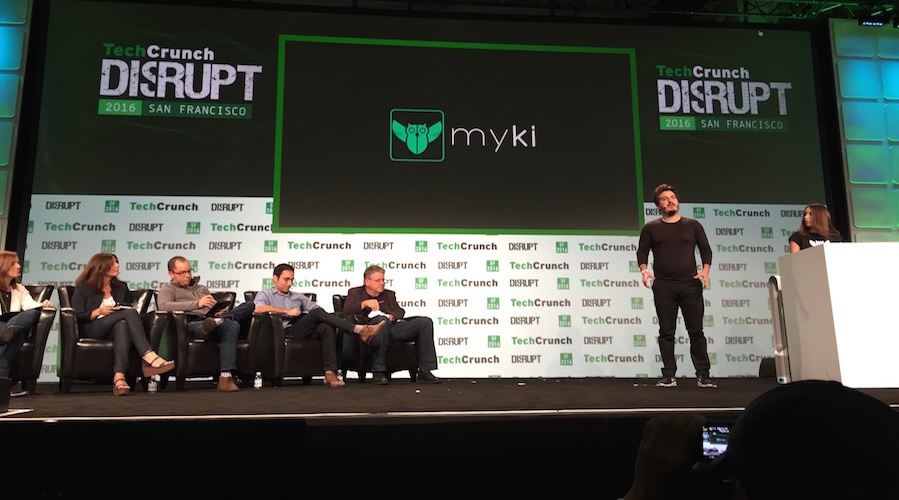Beirut-based Myki launches authentication solution at Techcrunch Disrupt

Take 5,000 plus attendees, a gigantic waterfront pier and some of the biggest names in Silicon Valley, and you get Techcrunch Disrupt San Francisco. The conference’s Startup Battlefield was one of the highlights of this three day melting pot of hungry global startups and curious investors.
Myki, a Lebanese startup that specializes in password protection, was among the 25 selected companies to battle their way to success at this year’s Disrupt SF. They pitched to five jury members on September 13, launching their next generation authentication solution live on the Disrupt stage.
“They’re looking for global solutions that have a huge market. They’re basically interested in a startup that has the potential to become a unicorn,” said Antoine Vincent Jebara, cofounder and CEO of Myki, on Techcrunch’s selection criteria.
“It was a very specific and tedious application, but it was worth it as we made the cut!” said Priscilla Elora Sharuk, cofounder and COO of Myki.
The two attended a Disrupt conference in New York a few years ago, but simply as attendees. At the time, Myki was in stealth mode, testing their product with companies, and tailoring it around those experiences, explained Sharuk. Attending the event as only attendees prior to applying helped them identify factors judges were looking for and learn best practices from other competing startups.

Their seed round, led by Beco Capital, helped them to further develop their product and hire talent. Today, they are a team of 15.
Contrary to other password management services, Myki stores passwords in your phone, allowing users to access them through the Myki Chrome extension safely via fingerprint authentication or a PIN.
This is a smart alternative to remote servers that can be vulnerable to hacks. It also removes the need to manually type in credentials every time a user logs into a different account online. The platform targets the B2B market for now.
“They seemed to have a compelling, straightforward solution to the problem of managing passwords,” said Anthony Ha, senior writer at Techcrunch and host of the Startup Battlefield.
Location, location, location
The entrepreneurial and investment climate is certainly more vibrant in Silicon Valley than it is in Beirut. Events like Disrupt are a great way for foreign startups to tap into the US market and mingle with internationally renowned VCs.
“It is difficult to succeed here,” said Sharuk. “But fortunately, there is a big diaspora and a lot of programs that are helping entrepreneurs to connect.”
Myki participated in an accelerator program called Startup Sauna in Helsinki in 2014, which brought them to Silicon Valley to meet with top VCs like Andreessen Horowitz and Sequoia Capital. They used the feedback they received and made the necessary changes early on before landing on the Disrupt stage.
When asked what advice they could offer to other aspiring MENA-based startups, Jebara said: “Look at what others are doing here in Silicon Valley and find a differentiator that distinguishes you from the rest. If you’re solving a big problem, then you’ll get there.”
Sharuk and Jebara warned that raising funds in Silicon Valley isn’t an easy task and required patience. It is a tedious process that took months of work and fostering relationships.
As for whether they want to keep their startup in Beirut, Jebara said: “We’ll do what’s best for the company. What is certain is that we will keep the development team there as they are very good.” Beirut is also a familiar environment to the founders, an important factor when deciding where to develop the product.
“When it comes to business development, we don’t know, we’re open to anything!”

On Techcrunch Disrupt
Even though Myki didn’t make it to the final round, being on that stage will have guaranteed them exposure to potential partners and investors.
“Seeing as we just launched, we obviously don’t have the same traction as some of the other competing startups that already have thousands of users and a monthly revenue,” said Sharuk.
They are now ready to raise their first Series A round and are speculating on whether this will be in Silicon Valley or in Beirut.
Even though the product is solving a global problem, there is a difference in the cultural contexts. In Silicon Valley, the people are much more tech centric with security at the forefront of concerns.
“In Beirut, we haven’t gotten to the point where security has become a very big issue, but it’s getting there,” said Sharuk.
“We do think the product can shine here in the Valley, but we want to start with the network that we know back home,” said Jebara. “We want to be the leading name in authentication in a region that we know and understand.”


